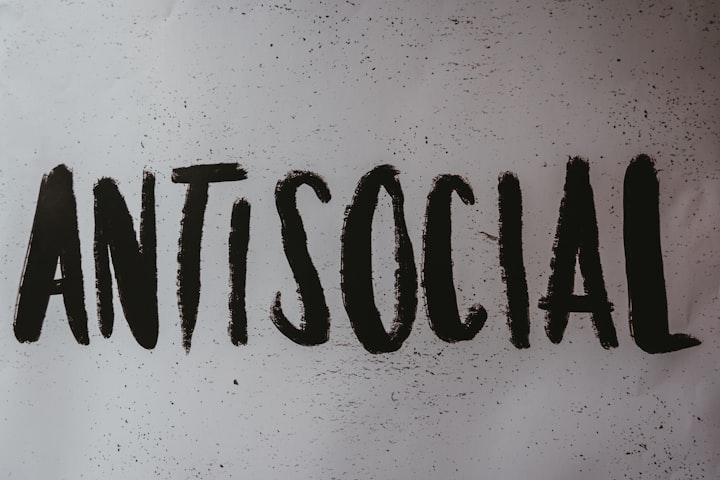Anti-Social Personality Disorder
What is ASPD? and why is it important to know about it?

There is no denying that most people associate ASPD with someone who has little to no indifference towards others. These people also seem to lack empathy; however, there has been no such agreement whether the characteristics or symptoms of ASPD are genetic, or they result from childhood.
ASPD can be defined as: "antisocial personality disorder (ASPD) is a condition characterized by a lack of empathy and regard for other people" (Cherry, 2022). Or it can also be defined as: "antisocial personality disorder (ASPD) describes an ingrained pattern of behavior in which individuals consistently disregard and violate the rights of others around them" (Psychology Today, 2014).
Most often it is associated with violent behavior and have insensitivity towards others. This type of disorder typically starts from a young age and continues into adulthood. The exact cause is unknown, as it could be either genetic or from a childhood trauma - causing them to develop the disorder.
Sociopathy vs. psychopathy
ASPD can be classified in two ways: Sociopathy and psychopathy. Despite neither being a recognized diagnostic word, people sometimes use the terms "sociopath" and "psychopath" interchangeably. An prior research, however, contends that sociopathy is more suitable when a brain damage, neurological impairments, or a belief system are factors in antisocial conduct. In the meanwhile, the term "psychopathy" refers to a specific collection of characteristics, and researchers nearly entirely focus on psychopathic characteristics in criminal groups.
Psychopathy may be marked by the behaviors of:
- Lack emotional responses.
- A lack of anxiety or fear.
- High attention-seeking
- Callousness
- Using lies and deceptions to manipulate others for their gain.
- Not paying any respect to the social norms.
- Hunger for power & dominance.
- Genetics - Compared to the general population, first-degree biological relatives of ASPD sufferers have a higher prevalence of the illness. According to research, the development of ASPD is definitely closely correlated with genetics and is likely made worse by environmental factors.
- Childhood or upbringing - Children may pick up on these behavioral patterns from abusive and dysfunctional parents and then use them with their own children in the future. The chances for children to have a strong sense of discipline, self-control, and empathy for others are also limited in households that are chaotic and uncaring for them.
- Brain Differences - Smoking during pregnancy and abnormal brain function, including all of these risks - they have the highest risk of a person getting ASPD. The frontal lobe of the brain, which is involved in planning and judgment, has been found to differ in individuals with ASPD, according to research.
Whereas a sociopath may be totally opposite of a psychopath.
While sociopathy results from contextual factors like inadequate parenting, psychopathy may be caused by heredity or other indirect causes like trauma.
Causes
Symptoms:
- No remorse or guilt for actions.
- Act out impulsively.
- Display aggressiveness and irritability.
- Lie and deceive others.
- Breaking social norms, including the law.
- Harassing others.
- "A diagnosis of conduct disorder before the age of 15" (Kivi, 2012).
- "Documentation or observation of at least three symptoms of ASPD since the age of 15" (Kivi, 2012).
- "Documentation or observation of symptoms of ASPD that don’t occur only during schizophrenic or manic episodes" (Kivi, 2012).
- Psychotherapy - Cognitive behavioral therapy (CBT) has been proven to be beneficial because it enables clients to understand why they behave in a particular manner and changes their unhelpful thought habits. Despite being a long-term treatment, the effects of this therapy have been proved to be successful. Group and family therapy, mentalization-based therapy, and other forms of treatment have also been studied as potential therapies for ASPD.
- Medications - The following drugs, among others, may be used to treat patients with ASPD and assist them in lowering their risk of acting violently:
Diagnosis
Despite the fact that antisocial personality disorder symptoms sometimes start in infancy, the problem is frequently not identified until later in life. However, those under the age of 18 cannot be diagnosed with ASPD. Those who exhibit symptoms similar to ASPD may have behavioral disorder. Only if a history of conduct disorder dates back to before the age of 15 may someone older than 18 be diagnosed with ASPD. There has to be a certain agenda in order to be conducted with ASPD:
Treatments
Having stated the causes and symptoms, it is pretty clear that it is very hard to treat. people with this type of disorder rarely seek out help due to the lack of money; but when they do, they receive altercation with the legal system.
However, there are some types of amendments when it comes to the right type treatments for ASPD. These include:
- Anti-anxiety medications,
- Anti-depressants,
- Anti-psychotics,
- Mood stabilizers.
Coping with ASPD:
Having ASPD may be a nuisance in itself but left untreated may cause the person to have much more erratic behavior than usual. It has an impact on one's capacity for employment and interpersonal connections. The condition may also hurt friends, family, coworkers, and unrelated others who may suffer as a result of the person's activities. Due to hazardous or illegal behaviors, the condition may lead to jail, harm, or death.
Conclusion
People with ASPD do not seek help on their own and intervention likely only happens due to legal problems. According to reports, "Men are much more likely to be diagnosed with antisocial personality disorder than women" (Haelle, 2019), however, the reasons are unknown. The only best thing to do in this case is conduct experiments and research that help with the anomaly of why men are more likely to have ASPD. According to two studies, 0.8% of women and 4.5 or 6.8% of males, respectively, are thought to have antisocial personality disorder.
It is also said that as the person gets older the symptoms presumably decrease, but it does not mean that the disorder disappears. Because they have spent their whole lives defying societal conventions and perhaps even engaged in self-destructive conduct, they may also suffer from a decrease in their mental, emotional, or physical health.
All in all, it is best to actually diagnose a person with ASPD as soon as they start showing signs or symptoms of the disorder. As this may reduce the chances of them committing crimes, may be able to control their aggressiveness, and may decrease the probability of them abusing anybody. however, most of the people ASPD don't seek for help. But if they do, it is also difficult to treat the disorder and is a long-term treatment. Due to the long-term treatment, it will also be hard to change the way ASPD patients behave and live their lives.
References:
Smith, J. and Tee-Melegrito, R.A. (2023). Sociopathy (antisocial personality disorder): What you need to know. [online] www.medicalnewstoday.com. Available at: https://www.medicalnewstoday.com/articles/320142 [Accessed: 5 Jun. 2023].
Haelle, T. (2019). Symptoms of Antisocial Personality Disorder | Everyday Health. [online] EverydayHealth.com. Available at: https://www.everydayhealth.com/antisocial-personality-disorder/symptoms/ [Accessed: 5 Jun. 2023].
Cherry, K. (2018). Symptoms and Treatment Options for Antisocial Personality Disorder. [online] Verywell Mind. Available at: https://www.verywellmind.com/antisocial-personality-disorder-2795566 [Accessed: 5 Jun. 2023].
Psychology Today (2014). Antisocial Personality Disorder | Psychology Today. [online] Psychology Today. Available at: https://www.psychologytoday.com/us/conditions/antisocial-personality-disorder [Accessed: 5 Jun. 2023].
Kivi, R. (2012). Antisocial Personality Disorder. [online] Healthline. Available at: https://www.healthline.com/health/antisocial-personality-disorder [Accessed: 5 Jun. 2023].





Comments
There are no comments for this story
Be the first to respond and start the conversation.